As one of the “big six” of the Civil rights movement, Whitney M. Young Jr. had the ear of presidents John Kennedy, Lyndon Johnson and Richard Nixon.
Young “knew how to accomplish what other people were merely for,” Nixon said after Young’s funeral in 1971, which he attended. “It’s really easy to be for what is right. what is more difficult is to accomplish what is right, and that’s what Whitney Young’s genius was.”
His genius and gentle persistence opened the doors of fortune 500 companies to African-Americans—an achievement acknowledged by many, including the current chairman and CEO of the American express Co., Kenneth Chenault, who says that Young “helped in many ways to pave the road for my success in corporate America.”
Both Chenault’s and Nixon’s comments are part of a soon-to-be released documentary, The Powerbroker, a film by Bonnie Boswell Hamilton, an award-winning reporter, producer and talk-show host, and Young’s niece.
She also was one of the keynote speakers at last year’s Whitney M. Young Jr. Memorial Conference, a student-run event sponsored by the Wharton School.
This year’s 38th annual conference—which will be held December 2-3 at the Loews Philadelphia hotel at 1200 Market Street—is designed to “provide enriching discussion and dialogue and great speakers that touch on global leadership and innovation on an expansive level,” says Nathaniel Johnson, WG’12, who is student co-chair of the event, along with Michelle Gittens, C’03, WG’12.
The previous conference brought together African American business, cultural and political leaders, along with Wharton faculty and other international experts, to talk about an array of topics and sectors, such as finance, education, entertainment, entrepreneurship, innovation and healthcare.
Gittens notes that the leadership conference also offers students and faculty networking opportunities with each other, as well as with the conference speakers.
Networking with business leaders was one of Young’s valuable skills.
“Much of his work was behind the scenes. … he was the person at the table who was having the conversations with presidents and corporate leaders,” Johnson says.
As director of the National Urban League, Young created educational and training programs for African Americans.
He also “was the main liaison to corporate America,” Hamilton says.
“He was able because of his relationships with people to offer logic and vision to people who were the heads of corporations. He was able to open up pathways for nonwhite men to enter the corporate structure,” Hamilton explains.
Young convinced the CEOs of Ford, Time Magazine and PepsiCo to hire blacks for management positions and increased overall minority job placements in corporations from 10,000 to 50,000 per year.
“His focus,” says Harvard University Professor Henry Louis gates in The Powerbroker, “was … more of an economic-based revolution.”
But it’s was a quiet and subtle revolution, notes Americus Reed II, associate professor of marketing and the Whitney M. Young Jr. Professor at Wharton.
Young was not a man looking for publicity, reed says. “It always was about the cause and the ideas rather than anything that might be related to self-promotion.”
And he didn’t shy away from his ideals, acting as one of the organizers of the March on Washington in august 1963 along with Dr. Martin Luther King Jr., even though many white business leaders opposed the action.
He also couldn’t always avoid controversy in those tumultuous days. he faced criticism by militant black Civil rights leaders for his close relationships with white businessmen and, in 1968, two men were convicted of conspiring to murder him, for being, they said, one of the “betrayers” of black people.
While many today do not remember Young—although that may change with the release of the movie—his legacy “underscores the importance of different perspectives and how different perspectives in corporate America and academia enrich everyone’s lives rather than taking away from it,” reed says.
He notes that some look at diversity in hiring as a “bad thing that takes people’s jobs,” but it should be viewed instead as a way to provide additional perspectives.
“Which means you get diversity in thought, which means more creative ideas happen, which means the entire environment for innovation is stronger,” reed says.
The filmmaker of the “the Powerbroker” is currently looking at several options for a broadcast partner but aims to have the movie on public television soon.

























